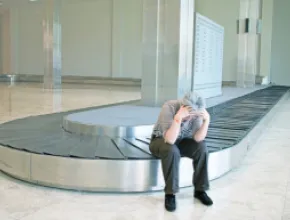Airport hotels are becoming more and more attractive to meeting planners as the economy continues to struggle and corporate purse strings remain tight.
"We weren’t sure what to expect this year, but we’ve been pleasantly surprised," says Paul Williamson, director of sales for the Embassy Suites Philadelphia Airport. "We are running at 80 to 85 percent occupancy."
Barbara Weeks, president and owner of Pasadena, Calif.-based Meetings Network, regularly plans meetings at airport properties and finds them to be well appointed for a variety of groups.
"I started meeting planning 22 years ago and have seen quite a change in airport properties," Weeks says. "These days, they are much more open to larger group meetings as opposed to individual travelers just flying in and out. Nowadays, many of them have great meeting space and even fully landscaped outdoor patios that guests can enjoy."
If you haven’t been to an airport hotel in five to 10 years, you are in for a treat, says Ray Robichaud, director of sales for the Westin Atlanta Airport.
"There has been a big shift in airport properties over the past several years," he says. "The quality of the hotels often comes as a surprise to planners when they come for a visit."
According to Victoria Jones, director of sales and marketing for the Hilton Los Angeles Airport, terminal-side properties have just as much to offer as downtown hotels.
"More and more airport properties are revamping themselves and really offering the same amenities as downtown properties and resorts," Jones says. "Some of them even have spas. Many people have the perception that airport properties have less food and beverage options, but that is not the case. I know that our hotel, for example, can stand up to any downtown property as far as that goes."
What is the reason for the wide-sweeping change to nicer digs? According to Robichaud, airport hotels now serve much wider purpose than in times past.
"Years ago, many airport hotels were built to be primarily transient properties; people would just fly in and out," he says. "Then, we began seeing more limited service properties pop up that worked well for transient guests, so they stole some of that business from full-service hotels. Therefore, the full-service properties have had to go after group business."
In order to attract the lucrative meetings market, hotels were forced to beef up their offerings. Now, it is commonplace to fly into a major metro and see AAA Four Diamond properties just outside the terminal.
Competitive Climate
While airport hotels have long been known for relatively affordable rates, the economic recession has caused many downtown hotels to slash their rates and offer other booking incentives. In this competitive climate, how are airport properties faring?
"Rates at airport hotels have come down as well," says Westin’s Robichaud. "But our pricing is still lower than downtown hotels."
Stephen Abbate, director of sales for the AAA Four Diamond Renaissance St. Louis Airport, notes that planners are looking for more than low prices.
"They are looking for value," he says. "Airport properties offer a great value because people don’t have to be transported into and out of a downtown core. They can get in, get out and get business done."
Unlike downtown locations, which are usually abuzz with activity, airport properties boast a quieter atmosphere, which can be an advantage for groups, according to Jones.
"When you go to an airport hotel, meeting attendees are not distracted," she says. "Instead, they feel like they are outside of the rat race."
Another advantage is transportation cost, she adds.
"The cost of transportation can really add up," Jones says. "If you fly in and then have to take a cab or a shuttle to a downtown property, companies just incur more cost, and sometimes it is the attendee who has to pay. If you hold your meeting at an airport property, chances are they will offer a complementary shuttle from the airport and sometimes even to downtown, which is a cost savings to the company."
Meeting Trends
What types of meetings fit well into airport hotels?
Short ones, says Robichaud.
"People usually come in for one- to three-day meetings that are very serious in nature," he says. "Companies want employees to come here, focus on what the meeting is about, and then get back to their jobs. They can fly in, go to a meeting and fly back without missing an entire week of work."
According to Williamson, the Embassy Suites in Philadelphia has traditionally attracted government contracting business, thanks to local providers. These days, though, things are changing.
"We are seeing a lot more RFPs than two years ago and many of them are coming from non-traditional outlets," Williamson says. "We are seeing pharmaceutical and biotech companies that would traditionally go to Center City coming to the airport. It really all comes down to cost.
"Most city center hotels charge for parking; we do not," he continues. "That can be a tremendous benefit when a lot of that charge is usually passed directly to guests. Here, we are willing to work with clients to offer complimentary shuttle service, so meeting attendees don’t have to rent cars."
In Los Angeles, Hilton’s Jones has also seen a sharp shift in client demographics.
"The types of meetings that are coming here have definitely changed in recent years," she says. "When the AIG scandal happened, we turned into an attractive alternative for pharmaceutical and insurance companies. They couldn’t go to resorts or high-end properties anymore because they didn’t want to be in the news.
"We took advantage of that and saw more corporate groups using airport properties as an alternative, especially in 2009," she continues. "This year, we are seeing a little softening on where companies can go."
If a meeting planner has never thought of holding an event at an airport hotel, what should they consider?
"The main thing planners should think about is the purpose of their meeting," Jones says. "If the event will be an intense training with a lot of information, airport properties have a lot of advantages.
On the Horizon
As the economy begins to heal, what will happen to demand for airport properties? Are they only a good idea when times are tough or is their appeal good in any economic climate?
"Companies are softening up a little bit in terms of where they go and higher-end properties are now offering lower rates to offer compelling packages for those companies," Jones says, adding that high-end properties in downtown locations are now increasingly posing stiff competition to airport locales. "But once the demand heightens again, I can see another shift [back to airport hotels] and airport properties will be a great value."
Williamson disagrees, saying that airport hotels are now firmly entrenched in the meetings market.
"Now that these folks have had to have meetings and events at the airport, we’ve been given a chance to showcase our properties and we think that the trend to use airport properties will continue," he says. "I have a strong feeling that we will see a lot of repeat business in the next few years."
St. Louis’ Abbate has a similar observation.
"I think airport hotels are in a great position right now," he says. "Business travel time is really becoming compressed these days. That three-to-four-day meeting has now been shrunk down to one or two days. In that way, I think airport properties are showing their value because transportation is not involved. I think the trend moving forward will be productivity and productivity in a quick way, and I think airport properties will benefit from it." MS
Katie Morell is a Chicago-based freelance writer and former Meetings Media editor. She is continually impressed by the selection of food at airports and has considered writing a book on which airports offer the best meals (Portland: sushi, Denver: Cobb salad, for example): www.katiemorell.com





